- Clone
- SFC1D8 (See other available formats)
- Regulatory Status
- RUO
- Other Names
- CCP2, Ctla5, Ctla-5, AI323531, B10, GzmC
- Isotype
- Armenian Hamster IgG
- Ave. Rating
- Submit a Review
- Product Citations
- publications
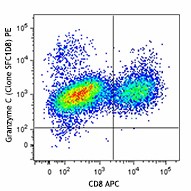
-

CD3+CD28 stimulated BALB/c splenocytes (in the presence of recombinant mouse IL-2) were stained with CD8 APC and Granzyme C (clone SFC1D8) PE (top) or Armenian Hamster IgG PE (bottom). -

| Cat # | Size | Price | Quantity Check Availability | Save | ||
|---|---|---|---|---|---|---|
| 150803 | 25 µg | $153 | ||||
| 150804 | 100 µg | $360 | ||||
Granzyme C is a serine protease that is found in the granules of cytotoxic T lymphocytes and natural killer cells (NKs). It induces the apoptosis of target cells by the externalization of phosphatidylserine, nuclear condensation and collapse, as well as the introduction of single-stranded DNA nicks. It can also induce apoptosis via mitochondrial swelling, which results in the loss of membrane potential. Reported studies show that granzyme C can support CTL-mediated killing in the absence of granzyme A or B. Additionally, wild-type mice have delayed upregulation of granzyme C relative to granzyme B and a mutation in the granzyme B gene shows earlier upregulation of granzyme C. Further studies show that in the event that granzyme B fails, the mouse models infected with persistent viruses have delayed expression of protection provided by granzyme C.
Product DetailsProduct Details
- Verified Reactivity
- Mouse
- Antibody Type
- Monoclonal
- Host Species
- Armenian Hamster
- Immunogen
- Purified recombinant granzyme C in CFA and boosted in IFA.
- Formulation
- Phosphate-buffered solution, pH 7.2, containing 0.09% sodium azide.
- Preparation
- The antibody was purified by affinity chromatography and conjugated with PE under optimal conditions.
- Concentration
- 0.2 mg/ml
- Storage & Handling
- The antibody solution should be stored undiluted between 2°C and 8°C, and protected from prolonged exposure to light. Do not freeze.
- Application
-
ICFC - Quality tested
- Recommended Usage
-
Each lot of this antibody is quality control tested by intracellular immunofluorescent staining with flow cytometric analysis. For flow cytometric staining, the suggested use of this reagent is ≤0.5 µg per million cells in 100 µl volume. It is recommended that the reagent be titrated for optimal performance for each application.
- Excitation Laser
-
Blue Laser (488 nm)
Green Laser (532 nm)/Yellow-Green Laser (561 nm)
-
Application References
(PubMed link indicates BioLegend citation) -
- Cai Sheng, et al. 2009. J. Immunol. 182:6287. (ICFC)
- Product Citations
-
- RRID
-
AB_2566430 (BioLegend Cat. No. 150803)
AB_2566430 (BioLegend Cat. No. 150804)
Antigen Details
- Distribution
-
Cytotoxic T lymphocytes and natural killer (NK) cells.
- Function
- Induces apoptotic cell death.
- Cell Type
- NK cells, T cells
- Biology Area
- Cell Biology, Immunology, Innate Immunity, Neuroscience
- Molecular Family
- Enzymes and Regulators, Proteases
- Antigen References
-
1. Bots M, et al. 2006. J. Cell. Sci. 119:5011.
2. Ley TJ, et al. 2003. Blood 101:3093.
3. Revell PA. 2005. J. Immunol. 2005. 174:2124.
4. Kelso A. 2002. Int. Immunol. 6:605.
5. Getachew Y, et al. 2008. J. Immunol. 181:7810.
6. Cai Sheng, et al. 2009. J. Immunol. 182:6287. - Gene ID
- 14940 View all products for this Gene ID
- UniProt
- View information about Granzyme C on UniProt.org
Related Pages & Pathways
Pages
Related FAQs
- What type of PE do you use in your conjugates?
- We use R-PE in our conjugates.
Other Formats
View All Granzyme C Reagents Request Custom Conjugation| Description | Clone | Applications |
|---|---|---|
| PE anti-mouse Granzyme C | SFC1D8 | ICFC |
| Purified anti-mouse Granzyme C | SFC1D8 | ICFC |
| FITC anti-mouse Granzyme C | SFC1D8 | ICFC |
| PE/Cyanine7 anti-mouse Granzyme C | SFC1D8 | ICFC |
| PerCP/Cyanine5.5 anti-mouse Granzyme C | SFC1D8 | ICFC |
| APC anti-mouse Granzyme C | SFC1D8 | ICFC |
Customers Also Purchased
Compare Data Across All Formats
This data display is provided for general comparisons between formats.
Your actual data may vary due to variations in samples, target cells, instruments and their settings, staining conditions, and other factors.
If you need assistance with selecting the best format contact our expert technical support team.
-
PE anti-mouse Granzyme C
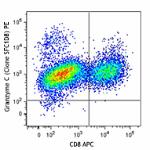
CD3+CD28 stimulated BALB/c splenocytes (in the presence of r... 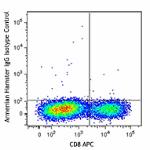
-
Purified anti-mouse Granzyme C
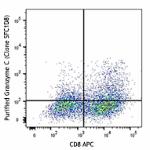
CD3+CD28 stimulated BALB/c splenocytes (in the presence of r... 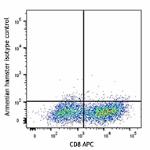
-
FITC anti-mouse Granzyme C
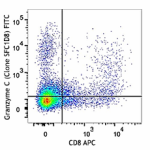
CD3 and CD28 stimulated BALB/c splenocytes (in the presence ... 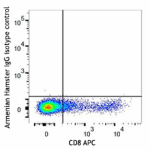
-
PE/Cyanine7 anti-mouse Granzyme C

CD3/CD28 stimulated BALB/c splenocytes (in the presence of r... -
PerCP/Cyanine5.5 anti-mouse Granzyme C

CD3/CD28 stimulated BALB/c splenocytes (in the presence of r... -
APC anti-mouse Granzyme C

CD3/CD28 stimulated BALB/c splenocytes (in the presence of r...

 Login/Register
Login/Register 










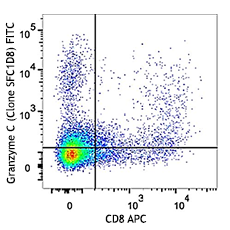

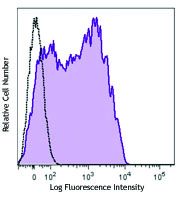



Follow Us